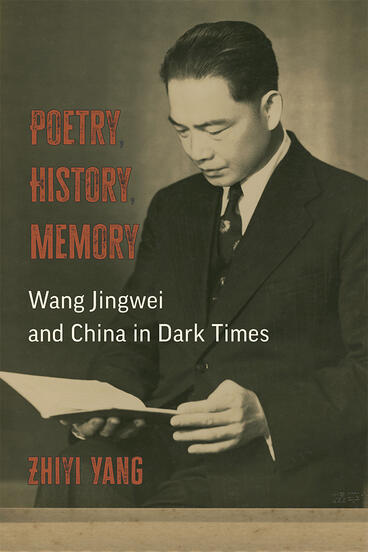Poetry, History, Memory
Wang Jingwei and China in Dark Times
The first comprehensive biography of Wang Jingwei, a poet, politician, and the most controversial figure in modern Chinese history
Description
Wang Jingwei, poet and politician, patriot and traitor, has always been a figure of major academic and popular interest. Until now, his story has never been properly told, let alone critically investigated. The significance of his biography is evident from an ongoing war on cultural memory: modern mainland China prohibits serious academic research on wartime collaboration in general, and on Wang Jingwei in particular. At this critical juncture, when the recollection of World War II is fading from living memory and transforming into historical memory, this knowledge embargo will undoubtedly affect how China remembers its anti-fascist role in WWII. In Poetry, History, Memory: Wang Jingwei and China in Dark Times, Zhiyi Yang brings us a long overdue reexamination of Wang’s impact on cultural memory of WWII in China.
In this book, Yang brings disparate methodologies into a fruitful dialogue, including sophisticated methods of poetic interpretation. The author argues that Wang’s lyric poetry, as the public performance of a private voice, played a central role in constructing his political identity and heavily influenced the public’s posthumous memory of him. Drawing on archives (in the PRC, Taiwan, Japan, the USA, France, and Germany), memoires, historical journals, newspapers, interviews, and other scholarly works, this book offers the first biography of Wang that addresses his political, literary, and personal life in a critical light and with sympathetic impartiality.
Zhiyi Yang is Professor of Sinology at the University of Frankfurt.
Reviews
“Wang Jingwei (1883–1944) was a man of great learning, educated first and foremost in the Chinese classics, then in Japan and France. His poetry, written in the classical styles, has been the object of admiration in China for a century already, despite deep divisions among historians over his controversial role following the Japanese invasion of his country and his assumption of the presidency of their client state, known as the “Reorganized National Government.” As a young man he had been a swashbuckling hero for the cause of the 1911 Revolution after his attempt to assassinate the Manchu Prince Regent. As an intellectual leader and senior statesman of the Kuomintang or Nationalist Party, he was broadly perceived as Sun Yat-sen’s political heir, only to be sidelined by Chiang Kai-shek, a military man, after Sun’s death in 1925. With this volume, Zhiyi Yang has done a superlative job of giving us an objective biography of Wang Jingwei, coupled with precise, yet highly readable translations of an informed selection of his poetry, reflecting his lyric self-portrait at key moments in modern Chinese history. This book is a must-read for anyone seeking to understand the real history of the Pacific Theatre during World War II and the tragic denouement of this all-important statesman, who could have led China onto a third path.”
- Jon Eugene von Kowallis
—Jon Eugene von Kowallis (UNSW Sydney), author of The Lyrical Lu Xun: A Study of His Classical-Style Verse and The Subtle Revolution: Poets of the ‘Old Schools’ during Late Qing and Early Republican China
“Wang Jingwei is among the most controversial figures in modern Chinese politics and literature. A patriot and a traitor, a revolutionary and a poet, a charismatic leader and a melancholy soul, Wang has taken various roles through his life, leaving behind only poetry to testify to his enigma. In this pioneering study, Zhiyi Yang has offered a most insightful and compelling exegesis of Wang Jingwei’s life and work. This is an indispensable book for anyone interested in early 20th century Sino-Japanese relations, classical-style poetry in modern China, and the politics of lyricism.”
- David Der-wei Wang, Harvard University
“China today has erased the problematic memory of romantic revolutionary-turned-despised collaborator Wang Jingwei from history. With this superb and profound book, literary scholar Zhiyi Yang offers an absorbing meditation on Wang’s poems that accepts the power of poetry to voice things that prose cannot, taking readers more deeply inside the enigma that has been Wang Jingwei than any author before her has ever done.”
- Tim Brook, University of British Columbia
“Yang challenges oversimplified views of a notorious but influential historical figure with a beautifully written, well-researched book. Adopting an empathetic neutrality and eschewing a nationalistic or apologetic narrative, the book masterfully reconstructs Wang’s intent to be understood and remembered through his poems. It testifies to the power of poetic analysis in exploring subjugated memory and political dilemmas.”
- Bin Xu, Emory University
“Zhiyi Yang’s book is a timely, striking, and compelling reexamination of the life of Wang Jingwei (1883–1944), who since the wartime period was often portrayed by modern Chinese historians as a “traitor.” Brilliant and uplifting, full of wonderful insight on every page, this book is a tour de force. Most importantly, it recovers the lyric persona of Wang Jingwei and convincingly argues that Wang’s poetry should play a central role in reconstructing Wang’s posthumous memory in history—just what modern readers need today.”
- Kang-i Sun Chang, Yale University
“The scholarship in this book provides an insightful and detailed rethinking of Wang Jingwei’s historical legacy, which sheds light on our understanding of China’s both nationalist and collaborative approaches to modernity.”
- Haosheng Yang, Miami University
"This book plays a significant role in illustrating how contemporary memory can be an effect of cultural and historical constructs, proving that established biographical "facts" and verdicts are well worth re-examination. More importantly, Yang's study showcases how revisiting Wang Jingwei and the "dark times" is relevant to our own experiences in today's world (i.e., that a nuanced perusal of the life and works of a "traitor" reveals truths about ourselves and the world then and now, and that defying taboos is for scholars a moral and intellectual obligation).
- Haihong Yang
--Modern Chinese Literature & Culture

